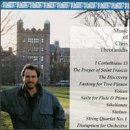| All Artists: Christopher Theofanidis, Shafer Mahoney, Robert Shewan, Rochester Composers Chorus & Brass Ensemble, Barrow Chamber Orchestra, Rochester Composers Orchestra, Roberts Wesleyan College Chorale, Peter Baichi, Ann Musser Honeywell, Mauricio Nader, Nancy Weems, Darla Barrow-Theofanidis Title: Music of Chris Theofanidis Members Wishing: 0 Total Copies: 0 Label: Albany Records Release Date: 11/29/1995 Genres: Pop, Soundtracks, Classical Styles: Vocal Pop, Opera & Classical Vocal, Chamber Music, Historical Periods, Modern, 20th, & 21st Century, Instruments, Keyboard, Reeds & Winds Number of Discs: 1 SwapaCD Credits: 1 UPC: 034061015826 |
Search - Christopher Theofanidis, Shafer Mahoney, Robert Shewan :: Music of Chris Theofanidis
 | Christopher Theofanidis, Shafer Mahoney, Robert Shewan Music of Chris Theofanidis Genres: Pop, Soundtracks, Classical
|
Larger Image |
CD Details |
CD ReviewsIn search of an individual voice Discophage | France | 03/27/2007 (3 out of 5 stars) "I encountered the music of Dallas-born Chris Theofanidis through his compact (11:40) violin concerto "On the Edge of the Infinite", included in a collection of contemporary works played by the Bowling Green Philharmonia, the students' orchestra from Bowling Green State University in Ohio (see my review of New Music From Bowling Green). With its fanfare-like opening orchestral outburst, which reminded me of the beginning of Lutoslawski's 3rd Symphony, and its fascinating semi-tone string slides from the orchestra and elaborately florid violin melismas bringing to mind the music of Korean composer Isang Yun, I found it original and interesting enough to make me want to investigate more of this young (1967) composer. This Albany CD seemed a good place to start. I find much of it disappointingly lacking in originality, though. Thoefanidis' setting of I Corinthians 13 for chorus, percussion, organ and brass is full of the bombastic fanfares one associates with Bloch and Honegger at their most tritely bombastic. Why two different recordings are offered is not explained. "The Discovery" for Chamber Orchestra goes one step backwards, to Virgil Thomson, Barber and Vaughan Williams at their most pastoral and "prairie-style". It was originally written as music for a documentary on a camp for "handicapped and non-handicapped teenagers in an environment of self-worth and interdependence", which only shows that this particular "Gebrauchmusik" (music conceived for a specific use) fails to transcend its original use and doesn't stand on its own. The reflective "Prayer of Saint Francis" sounds like some apprentice Duruflé (and the un-ingratiating chorus sounds like the congregation singing rather than like a trained ensemble). The Fantasy for Two Pianos has snap and wit, its only but not small limitation being that it could have been written by George Antheil at his most conservative, by Satie, by Milhaud or by the young and brash Shostakovich, and the Suite for Flute & Piano is likewise very much in the stylistic wake of French music from the twenties to forties (Roussel, Poulenc...). As for the String Quartet, with its strong rhythmic contour (the composition is based on the repetition of a same melodic cell submitted to continuous changes in meter), it is stylistically reminiscent of similar pieces by Krenek, Hindemith and the kind of "mildly modernist" style of composition prevalent in the 30s to 50s. Voices for soprano and orchestra sets to music three poems by respectively Emily Dickinson, Ezra Pound and Adrienne Rich. Its musical language is more up to date, dramatic and orchestrally colorful, though not very innovative but rather neo-Romantic in a post-Britten / post-Barber sort of way. Only in the short Ezra Pound fragment can one here the glissandos and mysterious melismas that made the Violin Concerto so striking. Its fine for a young composer to chose to ignore those innovations and advances in compositional writing introduced in the last 40 to 50 years by Ligeti, Crumb, Xenakis and the likes, provided that he discards them in favor of something of individuality. I don't hear that in the aforementioned works of Theofanidis. Some pieces on this disc however I thought displayed the kind of originality and individuality that I had heard in the Violin Concerto. The short (3:50) "Disruption for Orchestra" is not particularly innovative in its language - it is one of those dazzling and dramatic orchestral showpieces that can open a symphonic program to good effect - but interesting and fun nonetheless in its willingness to pull no punches and produce the greatest possible racket. It must be even more impressive heard live. "Sikelianos" (title unexplained in the liner notes. Is it the Greek to Siciliana ?) is an Octet adding to Schoenberg's "Pierrot Lunaire" instrumentation (flute, clarinet, violin, cello and piano) two congas and percussion. It is inspired by "Indian musical tradition" and brings to the fore those fascinating glissando melismas over abrupt punctuations by piano and congas, all organized in a 5 and ½ -minute crescendo build-up to a dramatic climax and abrupt end. It is very effective and quite fascinating. "Statues", a composition in five movements for solo piano, is also quite original in its willingness to explore the resonances produced by small melodic cells and its alternation of such mysteriously resonating chords and dramatic outbursts of awesome virtuosity. These are the two pieces that give you the impression that you are not hearing music that could have been written by so many other composers so many years before. Sikelianos and Statues both date from 1992 and the Violin Concerto from 1997. The other pieces on this disc are earlier compositions, ranging from 1988 (Fantasy) to 1992 (Voices and The Discovery). So maybe it is that Theofanidis found his own personal voice only from 1992 onwards. " Perfect. Discophage | 04/13/2001 (3 out of 5 stars) "Theofanidis's music is perfect in its form, harmony and melody. However, the music is a little too cliched and predictable at times. I can't wait to hear more from him."
|

 Track Listings (19) - Disc #1
Track Listings (19) - Disc #1